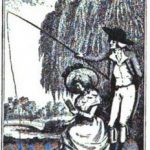February 26, 1996
This is a little late for some, and a little surprising for others, but we have some new additions to the Freethinkers Anonymous List. I would tell you their names, e-mail addresses, home addresses, and amusing and embarrassing details about their personal lives, but, well, the English language is a lot more amusing than anything I could tell you about them.
Speaking of Sri Lanka, do any of you out there receive "This Is True"? For those who don’t, it’s a weekly internet News of the Weird Digest that, until last week, was distributed to 92 countries worldwide. This week, believe it or not, number 93 was added, and it was none other than Sri Lanka. My operatives there were suitably impressed. Anyway, for any of you who don’t get it and would like to, here are the instructions:
TO RECEIVE "THIS is TRUE" every week free by e-mail, send e-mail to listserv@netcom.com with the message: "subscribe this-is-true" (without quotes) — please: nothing else on the line.
And here is something that could be true:
Evolving the English language
Having chosen English as the preferred language in the EEC (now officially the European Union, or EU), the European Parliament has commissioned a feasability study in ways of improving efficiency in communications between Government departments.
European officials have often pointed out that English spelling is unnecessarily difficult; for example: cough, plough, rough, through and thorough. What is clearly needed is a phased programme of changes to iron out these anomalies. The programme would be administered by a committee staff at top level by participating nations.
In the first year, for example, the committee would suggest using’s’ instead of the soft ‘c’. Sertainly, sivil servants in all sities would resieve this news with joy. Then the hard ‘c’ could be replaced by ‘k’ sinse both letters are pronounsed alike. Not only would this klear up konfusion in the minds of klerikal workers, but typewriters kould be made with one less letter.
There would be growing enthusiasm when in the sekond year, it was anounsed that the troublesome ‘ph’ would henseforth be written ‘f’. This would make words like ‘fotograf’ twenty persent shorter in print.
In the third year, publik akseptanse of the new spelling kan be expekted to reach the stage where more komplikated changes are possible. Governments would enkourage the removal of double letters which have always been a deterent to akurate speling.
We would al agre that the horible mes of silent ‘e’s in the languag is disgrasful. Therefor we kould drop thes and kontinu to read and writ as though nothing had hapend. By this tim it would be four years sins the skem began and peopl would be reseptive to steps sutsh as replasing ‘th’ by ‘z’. Perhaps zen ze funktion of ‘w’ kould be taken on by ‘v’, vitsh is, after al, half a ‘w’.
Shortly after zis, ze unesesary ‘o’ kould be dropd from words kontaining ‘ou’. Similar arguments vud of kors be aplid to ozer kombinations of leters.
Kontinuing zis proses yer after yer, ve vud eventuli hav a reli sensibl riten styl. After tventi yers zer vud be no mor trubls, difikultis and evrivun vud fin it ezi tu understand ech ozer. Ze drems of the Guvermnt vud finali hav kum tru.






Facebook Comments